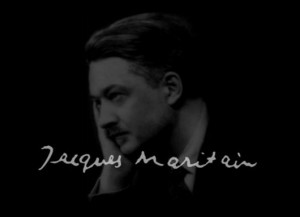“Fear him who can destroy soul and body in hell”
[powerpress]
an excerpt from today’s reflection by Don Schwager:
What does fear have to do with the kingdom of God? Fear is a powerful force. It can lead us to panic and flight or it can spur us to faith and action. The fear of God is the antidote to the fear of losing one’s life. I sought the Lord, and he answered me, and delivered me from all my fears. O fear the Lord, you his saints, for those who fear him have no want! Come, O sons, listen to me, I will teach you the fear of the Lord. (Psalm 34:4,9,11)
What is godly fear? It is reverence for the One who made us in love and who sustains us in mercy and kindness. The greatest injury or loss which we can experience is not physical but spiritual – the loss of one’s soul to the power of hell (Matthew 10:28). A healthy fear of God leads to spiritual maturity, wisdom and right judgment and it frees us from the tyranny of sinful pride, cowardice – especially in the face of evil, and spiritual deception. Do you trust in God’s grace and mercy and do you obey to his word?
“Lord Jesus, it is my joy and privilege to be your disciple. Give me strength and courage to bear any hardship and suffering which may come my way in serving you and obeying your will. May I witness to others the joy of the Gospel – the good news of your kingdom of peace, joy, and righteousness.”
for the full reflection visit : Daily Reading and Meditation
Tags: catholic, catholic podcast, catholic prayer, cathollc spirituality, gospel of matthew
This entry was posted on Saturday, July 12th, 2014 at 6:42 am
You can follow any responses to this entry through the RSS 2.0 feed.
Dr. Raymond Dennehy was a delight to talk to about the work and influence of 20th century French philosopher 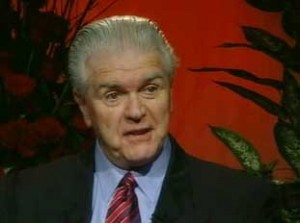 Jacques Maritain.  Ignatius Press has published in a special one volume set,  Maritain’s “Christianity and Democracy and the Rights of Man and the Natural Law”, which provides key insights for Christians in shaping the political and social orders.
Jacques Maritain.  Ignatius Press has published in a special one volume set,  Maritain’s “Christianity and Democracy and the Rights of Man and the Natural Law”, which provides key insights for Christians in shaping the political and social orders.
[powerpress]
Jacques Maritain was one of the principal exponents of Thomism, the philosophy of Saint Thomas Aquinas, in the modern world. He lived for many years in the United States, and taught at Princeton University and Columbia University. After WWII, he served as the French ambassador to the Vatican. He also helped draft the United Nations Universal Declaration of Human Rights (1948).
 You can find the book here
- “Maritain was one of the pioneers of the Catholic human rights revolution, which changed the course of 20th century politics. While helping the Church through a genuine development of social doctrine, Maritain helped forge some of the tools that eventually broke through the Berlin Wall.†– George Weigel, Ethics and Public Policy Center
“In these passionate words one encounters the mind of Maritain in all its vigor and variety. His reflections on the challenges facing the world’s democratic experiments – starkly realistic yet infused with Christian hope – are as timely today as they were seventy years ago.†– Mary Ann Glendon, Harvard University
“This has been one of my all-time favorite ‘David books’ – those little books that take down Goliaths. Almost single-handedly, Maritain launched a hypothesis on the Christian (and Jewish) origins of the foundational axioms of democracy, of which many atheists are now coming to admit the truth. The sheer power of his hypothesis is more evident with every passing year. The republication of this classic is therefore bound to kindle longing for a deeper, more just reevaluation.†– Michael Novak, American Enterprise Institute
Tags: catholic, catholic podcast, catholic prayer, cathollc spirituality, Jacques Maritain, Michael Novak, modern democracy, philosophy, political philosophers, Raymond Dennehy, work
This entry was posted on Saturday, July 12th, 2014 at 12:06 am
You can follow any responses to this entry through the RSS 2.0 feed.
[powerpress]
With loving provident care,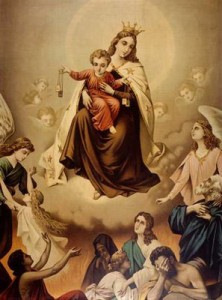
O Mother Most Amiable,
you covered us with your Scapular
as a shield of defense against the Evil One.
Through your assistance,
may we bravely struggle against the powers of evil,
always open to your Son Jesus Christ.
(State your request here…)
Recite the following prayers…
Our Father…
Hail Mary…
Glory Be…
Our Lady of Mount Carmel,
pray for us.
Tags: catholic, catholic podcast, catholic prayer, cathollc spirituality, our lady of mount carmel, provident care
This entry was posted on Saturday, July 12th, 2014 at 12:05 am
You can follow any responses to this entry through the RSS 2.0 feed.
[powerpress]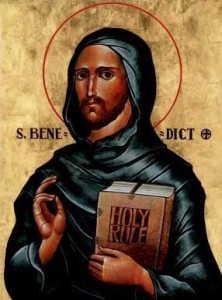
Lord, have mercy on us.
Christ, have mercy on us.
Lord, have mercy on us. Christ, hear us.
Christ, graciously hear us.
God the Father of Heaven,
Have mercy on us.
God the Son, Redeemer of the world,
Have mercy on us.
God the Holy Spirit,
Have mercy on us.
Holy Trinity, One God,
Have mercy on us.
Holy Mary,
Pray for us.
Holy Mother of God,
Pray for us.
Holy Virgin of virgins,
Pray for us.
Holy Father, Saint Benedict,
Pray for us.
Father most reverend,
Pray for us.
Father most renowned,
Pray for us.
Father most compassionate,
Pray for us.
Man of great fortitude,
Pray for us.
Man of venerable life,
Pray for us.
Man of the most holy conversation,
Pray for us.
True servant of God,
Pray for us.
Light of devotion,
Pray for us.
Light of prayer,
Pray for us.
Light of contemplation,
Pray for us.
Star of the world,
Pray for us.
Best master of an austere life,
Pray for us.
Leader of the holy warfare,
Pray for us.
Leader and chief of monks,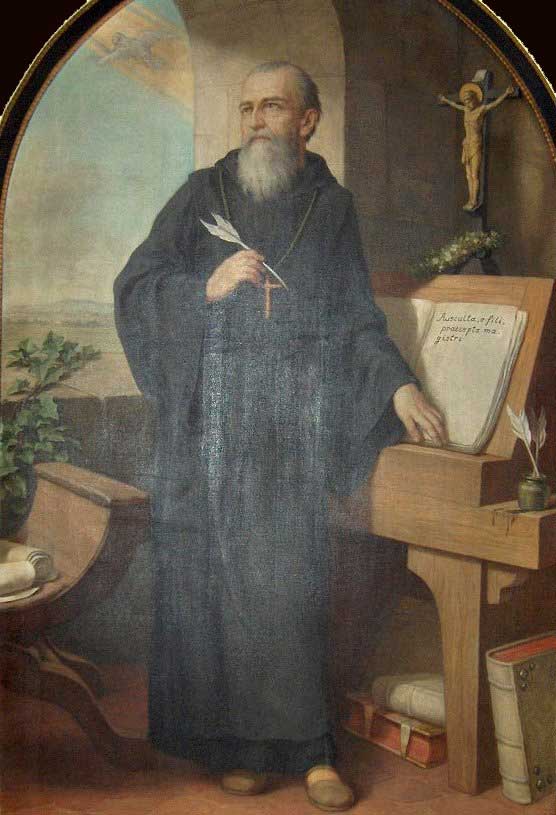
Pray for us.
Master of those who die to the world,
Pray for us.
Protector of those who cry to thee,
Pray for us.
Wonderful worker of miracles,
Pray for us.
Revealer of the secrets of the human heart,
Pray for us.
Master of spiritual discipline,
Pray for us.
Companion of the patriarchs,
Pray for us.
Equal of the prophets,
Pray for us.
Follower of the Apostles,
Pray for us.
Teacher of martyrs,
Pray for us.
Father of many pontiffs,
Pray for us.
Gem of abbots,
Pray for us.
Glory of confessors,
Pray for us.
Imitator of anchorites,
Pray for us.
Associate of virgins,
Pray for us.
Colleague of all the saints,
Pray for us.
Lamb of God, Who takest away the sins of the world,
Spare us, O Lord.
Lamb of God, Who takest away the sins of the world,
Graciously hear us, O Lord.
Lamb of God, Who takest away the sins of the world,
Have mercy on us.
V. Intercede for us, O holy father Saint Benedict,
R. That we may be made worthy of the promises of Christ.
Let Us Pray
O God, Who hast called us from the vanity of the world,
and Who dost incite us
to the reward of a heavenly vocation
under the guidance of our holy patriarch
and founder, Saint Benedict,
inspire and purify our hearts
and pour forth on us Thy grace,
whereby we may persevere in Thee.
Through Jesus Christ,
Our Lord.
Amen
Tags: catholic, catholic podcast, catholic prayer, cathollc spirituality, God the Holy Spirit, holy trinity, Saint Benedict
This entry was posted on Friday, July 11th, 2014 at 3:20 pm
You can follow any responses to this entry through the RSS 2.0 feed.
Bruce and I had a great conversation with Mike Aquilina about the great St. Benedict.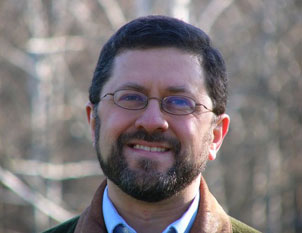
[powerpress]
Here is a teaching from another Benedict our Holy Father Pope Benedict XVI
St Peter’s Square
Wednesday, 9 April 2008
Dear Brothers and Sisters,
Today, I would like to speak about Benedict, the Founder of Western Monasticism and also the Patron of my Pontificate. I begin with words that St Gregory the Great wrote about St Benedict: “The man of God who shone on this earth among so many miracles was just as brilliant in the eloquent exposition of his teaching” (cf. Dialogues II, 36). The great Pope wrote these words in 592 A.D. The holy monk, who had died barely 50 years earlier, lived on in people’s memories and especially in the flourishing religious Order he had founded. St Benedict of Norcia, with his life and his work, had a fundamental influence on the development of European civilization and culture. The most important source on Benedict’s life is the second book of St Gregory the Great’s Dialogues. It is not a biography in the classical sense. In
accordance with the ideas of his time, by giving the example of a real man – St Benedict, in this case – Gregory wished to illustrate the ascent to the peak of contemplation which can be achieved by those who abandon themselves to God. He therefore gives us a model for human life in the climb towards the summit of perfection. St Gregory the Great also tells in this book of the Dialogues of many miracles worked by the Saint, and here too he does not merely wish to recount something curious but rather to show how God, by admonishing, helping and even punishing, intervenes in the practical situations of man’s life. Gregory’s aim was to demonstrate that God is not a distant hypothesis placed at the origin of the world but is present in the life of man, of every man.
This perspective of the “biographer” is also explained in light of the general context of his time: straddling the fifth and sixth centuries, “the world was overturned by a tremendous crisis of values and institutions caused by the collapse of the Roman Empire, the invasion of new peoples and the decay of morals”. But in this terrible situation, here, in this very city of Rome, Gregory presented St Benedict as a “luminous star” in order to point the way out of the “black night of history” (cf. John Paul II, 18 May 1979).
In fact, the Saint’s work and particularly his Rule were to prove heralds of an authentic spiritual leaven which, in the course of the centuries, far beyond the boundaries of his country and time, changed the face of Europe following the fall of the political unity created by the Roman Empire, inspiring a new spiritual and cultural unity, that of the Christian faith shared by the peoples of the Continent. This is how the reality we call “Europe” came into being.
St Benedict was born around the year 480. As St Gregory said, he came “ex provincia Nursiae” – from the province of Norcia. His well-to-do parents sent him to study in Rome. However, he did not stay long in the Eternal City. As a fully plausible explanation, Gregory mentions that the young Benedict was put off by the dissolute lifestyle of many of his fellow students and did not wish to make the same mistakes. He wanted only to please God: “soli Deo placere desiderans” (II Dialogues, Prol. 1). Thus, even before he finished his studies, Benedict left Rome and withdrew to the solitude of the mountains east of Rome. After a short stay in the village of Enfide (today, Affile), where for a time he lived with a “religious community” of monks, he became a hermit in the neighbouring locality of Subiaco. He lived there completely alone for three years in a cave which has been the heart of a Benedictine Monastery called the “Sacro Speco” (Holy Grotto) since the early Middle Ages. The period in Subiaco, a time of solitude with God, was a time of maturation for Benedict. It was here that he bore and overcame the three fundamental temptations of every human being: the temptation of self-affirmation and the desire to put oneself at the centre, the temptation of sensuality and, lastly, the temptation of anger and revenge. In fact, Benedict was convinced that only after overcoming these temptations would he be able to say a useful word to others about their own situations of neediness. Thus, having tranquilized his soul, he could be in full control of the drive of his ego and thus create peace around him. Only then did he decide to found his first monasteries in the Valley of the Anio, near Subiaco.
In the year 529, Benedict left Subiaco and settled in Monte Cassino. Some have explained this move as an escape from the intrigues of an envious local cleric. However, this attempt at an explanation hardly proved convincing since the latter’s sudden death did not induce Benedict to return (II Dialogues, 8). In fact, this decision was called for because he had entered a new phase of inner maturity and monastic experience. According to Gregory the Great, Benedict’s exodus from the remote Valley of the Anio to Monte Cassio – a plateau dominating the vast surrounding plain which can be seen from afar – has a symbolic character: a hidden monastic life has its own raison d’être but a monastery also has its public purpose in the life of the Church and of society, and it must give visibility to the faith as a force of life. Indeed, when Benedict’s earthly life ended on 21 March 547, he bequeathed with his Rule and the Benedictine family he founded a heritage that bore fruit in the passing centuries and is still bearing fruit throughout the world. (more…)
Tags: benedictines, catholic, catholic podcast, catholic prayer, cathollc spirituality, Europe, mike aquilina, Roman Empire, st benedict, st. paul center for biblical theology
This entry was posted on Friday, July 11th, 2014 at 5:02 am
You can follow any responses to this entry through the RSS 2.0 feed.
[powerpress]
O Mother of Fair Love,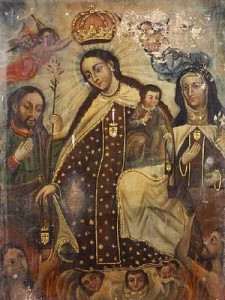
through your goodness,
as your children,
we are called to live in the spirit of Carmel.
Help us to live in charity with one another,
prayerful as Elijah of old,
and mindful of our call to minister to God’s people.
(State your request here…)
Recite the following prayers…
Our Father…
Hail Mary…
Glory Be…
Our Lady of Mount Carmel,
pray for us.
Tags: catholic, catholic podcast, catholic prayer, cathollc spirituality
This entry was posted on Friday, July 11th, 2014 at 12:01 am
You can follow any responses to this entry through the RSS 2.0 feed.
“Freely have you received – freely give”
[powerpress]
an excerpt from today’s reflection by Don Schwager:
Jesus said to his disciples: Freely you have received, freely give. What they have received from Jesus they must now pass on to others without expecting a favor in return, whether it be in form of a gift or payment. They must show by their attitude that their first interest is in serving God, not receiving material gain. They must serve without guile, full of charity and peace, and simplicity. They must give their full attention to the proclamation of God’s kingdom and not be diverted by other lesser things. They must travel light – only take what was essential and leave behind whatever would distract them – in order to concentrate on the task of speaking the word of the God. They must do their work, not for what they can get out of it, but for what they can give freely to others, without expecting special privileges or reward. “Poverty of spirit” frees us from greed and preoccupation with possessions and makes ample room for God’s provision. The Lord wants his disciples to be dependent on him and not on themselves.
Secondly, Jesus said: the worker deserves his sustenance. Here we see a double-truth: the worker of God must not be overly-concerned with material things, but the people of God must never fail in their duty to give the worker of God what he or she needs to sustain themselves in the Lord’s service. Do you pray for the work of the Gospel and do you support it with your material and financial resources?
Jesus ends his instructions with a warning: If people reject God’s invitation and refuse his word, then they bring judgment and condemnation on themselves. When God gives us his word there comes with it the great responsibility to respond. Indifference will not do. We are either for or against God in how we respond to his word. God gives us his word that we may have life – abundant life – in him. He wills to work in and through each of us for his glory. God shares his word with us and he commissions us to speak it boldly and simply to others. Do you witness the truth and joy of the Gospel by word and example to those around you?
“Lord Jesus, may the joy and truth of the Gospel transform my life that I may witness it to those around me. Grant that I may spread your truth and your light wherever I go.â€
for the full reflection visit : Daily Reading and Meditation
Tags: catholic, catholic podcast, catholic prayer, cathollc spirituality
This entry was posted on Thursday, July 10th, 2014 at 7:57 am
You can follow any responses to this entry through the RSS 2.0 feed.
Novena to St. Benedict Day 9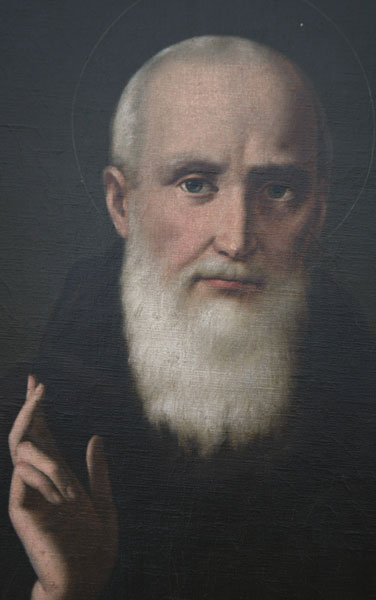
[powerpress]
In the Holy Rule, St. Benedict you have said:
As there is a harsh and evil zeal which separates from God and leads to hell, so there is a virtuous zeal which separates from vice and leads to God and life everlasting.
Let the monks, therefore, practice this zeal with most ardent love; namely, that in honor they forerun one another (cf Rom 12:10). Let them bear their infirmities, whether of body or mind, with the utmost patience; let them vie with one another in obedience. Let no one follow what he thinks useful to himself, but rather to another. Let them practice fraternal charity with a chaste love.
Let them fear God and love their Abbot with sincere and humble affection; let them prefer nothing whatever to Christ, and my He lead us all together to life everlasting. Â (Holy Rule 72)
Glorious Saint Benedict,
sublime model of virtue, pure vessel of God’s grace!
Behold me humbly kneeling at your feet.
I implore you in your loving kindness to pray for me before the throne of God.
To you I have recourse in the dangers that daily surround me.
Shield me against my selfishness and my indifference to God and to my neighbor.
Inspire me to imitate you in all things.
May your blessing be with me always, so that I may see and serve Christ in others and work for His kingdom.
Graciously obtain for me from God those favors and graces which I need so much in the trials, miseries and afflictions of life.
Your heart was always full of love, compassion and mercy toward those who were afflicted or troubled in any way.
You never dismissed without consolation and assistance anyone who had recourse to you.
I therefore invoke your powerful intercession, confident in the hope that you will hear my prayers and obtain for me the special grace and favor I earnestly implore.
{mention your petition}
Help me, great Saint Benedict, to live and die as a faithful child of God, to run in the sweetness of His loving will, and to attain the eternal happiness of heaven.
Amen.
O Holy Father, St. Benedict, pray for us.
Tags: catholic, catholic podcast, catholic prayer, cathollc spirituality
This entry was posted on Thursday, July 10th, 2014 at 6:56 am
You can follow any responses to this entry through the RSS 2.0 feed.
[powerpress]
When you gave us, Gracious Lady,
the Scapular as our Habit,
you called us to be not only servants,
but also your own children.
We ask you to gain for us from your Son
the grace to live as your children in joy, peace and love.
(State your request here…)
Recite the following prayers…
Our Father…
Hail Mary…
Glory Be…
Our Lady of Mount Carmel,
pray for us.
Tags: catholic, catholic podcast, catholic prayer, cathollc spirituality, Gracious Lady, our lady of mount carmel
This entry was posted on Thursday, July 10th, 2014 at 12:03 am
You can follow any responses to this entry through the RSS 2.0 feed.
Jesus gives his disciples authority to heal and set free
[powerpress]
an excerpt from today’s reflection by Don Schwager:
The Gospel (which literally means “good news”) which Jesus proclaimed is just as relevant and real today, the kingdom of heaven is at hand. If we believe in the Lord Jesus, the Word of God made flesh, and in the power of the Gospel, we will know and experience the freedom, joy, and power he gives us that enables us to live and witness as his disciples. No one can buy heaven; but if we know the love and mercy of Jesus Christ, then we already possess heaven in our hearts! Do you believe that Jesus can change and transform your life and share with you the power and authority of God’s kingdom?
Jesus chose ordinary people to do extraordinary work
Jesus commissioned his disciples to carry on the works which he did – to speak God’s word and to bring his healing power to the weary and oppressed. In the choice of the twelve apostles we see a characteristic feature of God’s work – Jesus chose very ordinary people. They were non-professionals, had no wealth or privileged position. They were chosen from the common people who did ordinary things, had no special education, and no social advantages.
Jesus wanted ordinary people who could take an assignment and do it extraordinarily well. He chose these men, not for what they were, but for what they would be capable of becoming under his direction and power. When the Lord calls us to serve, we must not think we have nothing or very little to offer. The Lord takes what ordinary people, like us, can offer and uses it for greatness in his kingdom. Do you believe that God wants to work in and through you for his glory?
“Lord Jesus, you have chosen me to be your disciple. Take and use what I can offer, however meager it may seem, for the greater glory of your name.”
for the full reflection visit : Daily Reading and Meditation
Tags: catholic, catholic podcast, catholic prayer, cathollc spirituality
This entry was posted on Wednesday, July 9th, 2014 at 7:30 am
You can follow any responses to this entry through the RSS 2.0 feed.
Novena to St. Benedict Day 8 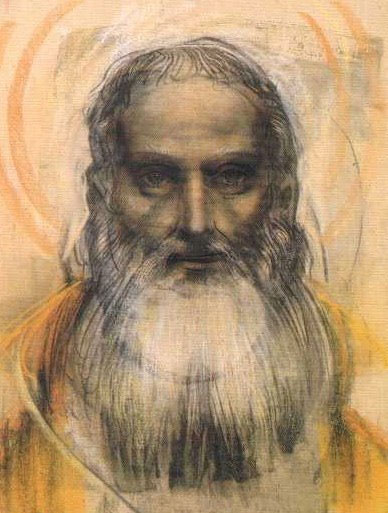
[powerpress]
In the Holy Rule, St. Benedict you have said:
If we do not venture to approach men who are in power, except with humility and reverence, when we wish to ask a favor, how much must we beseech the Lord God of all things with all humility and purity of devotion? And let us be assured that it is not in many words, but in the purity of heart and tears of compunction that we are heard. For this reason prayer ought to be short and pure, unless, perhaps it is lengthened by the inspiration of divine grace. At the community exercises, however, let the prayer always be short, and the sign having been given by the Superior, let all rise together. Â (Holy Rule 20)
Glorious Saint Benedict,
sublime model of virtue, pure vessel of God’s grace!
Behold me humbly kneeling at your feet.
I implore you in your loving kindness to pray for me before the throne of God.
To you I have recourse in the dangers that daily surround me.
Shield me against my selfishness and my indifference to God and to my neighbor.
Inspire me to imitate you in all things.
May your blessing be with me always, so that I may see and serve Christ in others and work for His kingdom.
Graciously obtain for me from God those favors and graces which I need so much in the trials, miseries and afflictions of life.
Your heart was always full of love, compassion and mercy toward those who were afflicted or troubled in any way.
You never dismissed without consolation and assistance anyone who had recourse to you.
I therefore invoke your powerful intercession, confident in the hope that you will hear my prayers and obtain for me the special grace and favor I earnestly implore.
{mention your petition}
Help me, great Saint Benedict, to live and die as a faithful child of God, to run in the sweetness of His loving will, and to attain the eternal happiness of heaven.
Amen.
O Holy Father, St. Benedict, pray for us.
Tags: catholic, catholic podcast, catholic prayer, cathollc spirituality
This entry was posted on Wednesday, July 9th, 2014 at 6:27 am
You can follow any responses to this entry through the RSS 2.0 feed.
[powerpress]
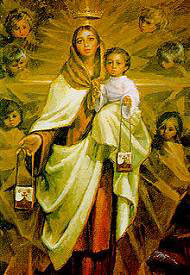
O Queen of Heaven,
you gave us the Scapular as an outward sign
by which we might be known as your faithful children.
May we always wear it with honor
by avoiding sin and imitating your virtues.
Help us to be faithful to this desire of ours.
(State your request here…)
Recite the following prayers…
Our Father…
Hail Mary…
Glory Be…
Our Lady of Mount Carmel,
pray for us.
Tags: catholic, catholic podcast, catholic prayer, cathollc spirituality, faithful children, our lady of mount carmel
This entry was posted on Wednesday, July 9th, 2014 at 12:58 am
You can follow any responses to this entry through the RSS 2.0 feed.
“Never seen anything like this”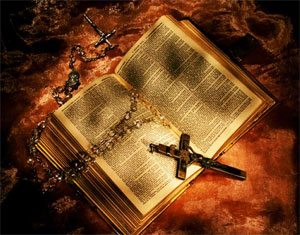
[powerpress]
an excerpt from today’s reflection by Don Schwager:
What help and hope can we give to someone who experiences chronic distress or some incurable disease of mind and body? Spiritual, emotional, and physical suffering often go hand in hand. Jesus was well acquanited with individuals who suffered intolerable affliction – whether physical, emotional, mental, or spiritual. A “dumb demoniac” was brought to Jesus by his friends with the hope that Jesus would set the troubled man free. These neighbors, no doubt, took pity on this man who had a double impediment. He had not only lost his ability to speak, but was also greatly disturbed in mind and spirit. This was no doubt due to the influence of evil spirits who tormented him day and night with thoughts of despair and hopeless abandonment by God.
Jesus immediately set him free from the demon who tormented him and restored his ability to speak at the same time. This double miracle brought wonder to the crowds who watched in amazement. “Nothing like this had ever been done before in the land of Israel!” Whenever people approached Jesus with expectant faith, he set them free from whatever afflicted them – whether it be a disease of mind and body, a crippling burden of guilt and sin, a tormenting spirit or uncontrollable fear of harm.
Whenever the Gospel is proclaimed God’s kingdom is made manifest and new life and freedom is given to those who respond with faith. The Lord grants freedom to all who turn to him with trust. Do you bring your troubles to the Lord with expectant faith that he can set you free? The Lord invites us to pray that the work of the Gospel may spread throughout the world, so that all may find true joy and freedom in Jesus Christ.
“Lord Jesus, may your kingdom come to all who are oppressed and in darkness. Fill my heart with compassion for all who suffer mentally and physically. Use me to bring the good news of your saving grace and mercy to those around me who need your healing love and forgiveness.â€
for the full reflection visit : Daily Reading and Meditation
Tags: catholic, catholic podcast, catholic prayer, cathollc spirituality
This entry was posted on Tuesday, July 8th, 2014 at 6:45 am
You can follow any responses to this entry through the RSS 2.0 feed.
Novena to St. Benedict Day 7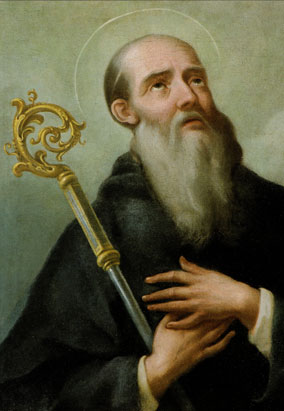
[powerpress]
In the Holy Rule, St. Benedict you have said:
We believe that God is present everywhere and that the eyes of the Lord behold the good and the bad in every place (cf Prov 15:3). Let us firmly believe this, especially when we take part in the Work of God. Let us, therefore, always be mindful of what the Prophet says, “Serve the Lord with fear” (Ps 2:11). And again, “Sing wisely” (Ps 46[47]:8). And, “I will sing praise to Thee in the sight of the angels” (Ps 137[138]:1). Therefore, let us consider how it becomes us to behave in the sight of God and His angels, and let us so stand to sing, that our mind may be in harmony with our voice. Â (Holy Rule 19)
Glorious Saint Benedict,
sublime model of virtue, pure vessel of God’s grace!
Behold me humbly kneeling at your feet.
I implore you in your loving kindness to pray for me before the throne of God.
To you I have recourse in the dangers that daily surround me.
Shield me against my selfishness and my indifference to God and to my neighbor.
Inspire me to imitate you in all things.
May your blessing be with me always, so that I may see and serve Christ in others and work for His kingdom.
Graciously obtain for me from God those favors and graces which I need so much in the trials, miseries and afflictions of life.
Your heart was always full of love, compassion and mercy toward those who were afflicted or troubled in any way.
You never dismissed without consolation and assistance anyone who had recourse to you.
I therefore invoke your powerful intercession, confident in the hope that you will hear my prayers and obtain for me the special grace and favor I earnestly implore.
{mention your petition}
Help me, great Saint Benedict, to live and die as a faithful child of God, to run in the sweetness of His loving will, and to attain the eternal happiness of heaven.
Amen.
O Holy Father, St. Benedict, pray for us.
Tags: catholic, catholic podcast, catholic prayer, cathollc spirituality
This entry was posted on Tuesday, July 8th, 2014 at 6:09 am
You can follow any responses to this entry through the RSS 2.0 feed.
[powerpress]
Most Holy Mary, Our Mother, in your great love for us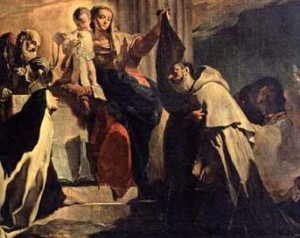
you gave us the Holy Scapular of Mount Carmel,
having heard the prayers
of your chosen son Saint Simon Stock.
Help us now to wear it faithfully and with devotion.
May it be a sign to us of our desire to grow in holiness.
(State your request here…)
Recite the following prayers…
Our Father…
Hail Mary…
Glory Be…
Our Lady of Mount Carmel,
pray for us.
Tags: catholic, catholic podcast, catholic prayer, cathollc spirituality, Holy Scapular of Mount Carmel, our lady of mount carmel, Saint Simon Stock
This entry was posted on Tuesday, July 8th, 2014 at 12:02 am
You can follow any responses to this entry through the RSS 2.0 feed.

